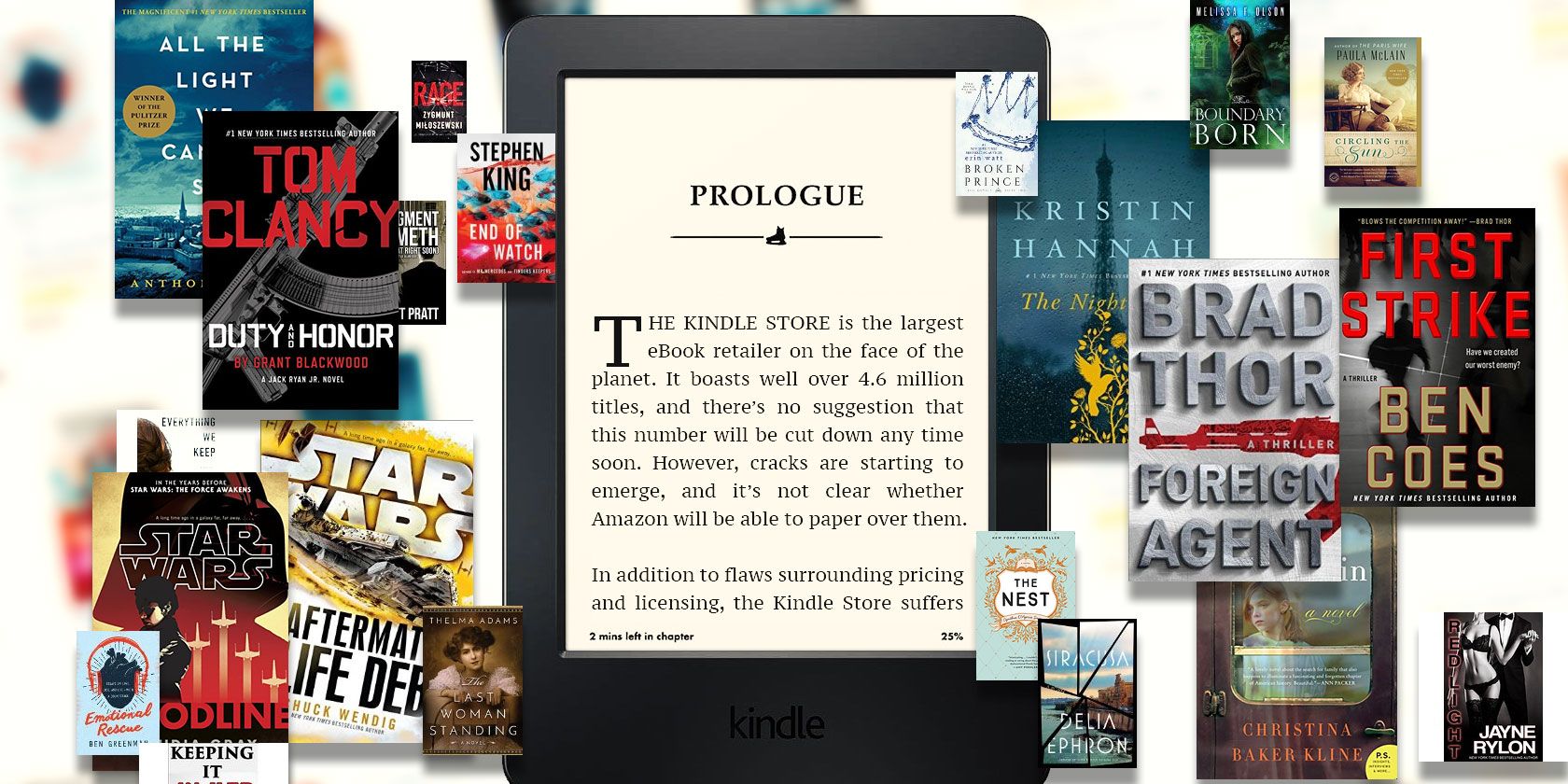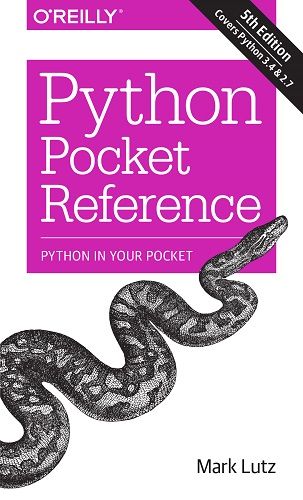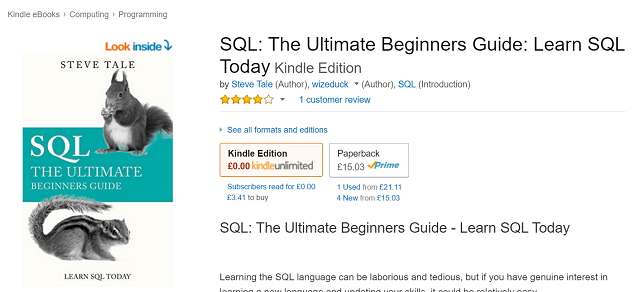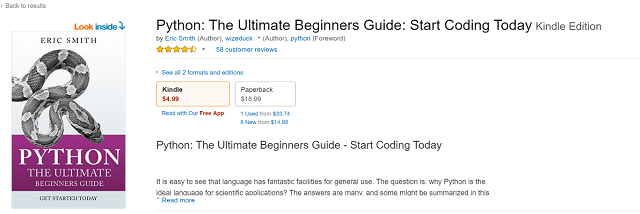The Kindle Store is the largest eBook retailer on the face of the planet. It boasts well over 4.6 million titles, and there's no suggestion that this number will be cut down any time soon. However, cracks are starting to emerge, and it's not clear whether Amazon will be able to paper over them.
In addition to flaws surrounding pricing and licensing, the Kindle Store suffers from the fate that befalls all online digital marketplaces – as the gatekeepers to publication have been removed, quality content has become surrounded by a vast pool of garbage.
Hastily written, cynically made garbage, designed to part people from their money, and offer nothing in return. So, what can be done about all of the problems the Kindle Store currently has? Can Amazon turn this thing around and deliver the service we all deserve? Let's find out…
Deception and Dishonesty Abounds
O'Reilly Media is one of the most recognizable and respected technology publishers on the planet. What makes it so highly regarded is the emphasis it places on quality. The books it releases are written by the world's greatest developers and technologists – experts in their fields. In addition, everything it publishes is vigorously checked by an editorial team which consists of copy editors and qualified technical reviewers.
Books published by O'Reilly Media are easily identifiable by their distinctive front covers, which feature animals sketched in black pencil. Just the presence of the "O'Reilly Animal" front cover implies quality, in the same way the Nissan logo does for cars. It's for this reason that some people would aim to copy it.
Just a quick walk through the Kindle Store reveals many books "paying tribute" to this iconic styling. Check this book from Steve Tale and WizeDuck called SQL: The Ultimate Beginners Guide. By looking at it, you'd assume that it was an official O'Reilly Publication. But it isn't. At all.
This isn't an isolated incident. Another book published by WizeDuck called Python: The Ultimate Beginners Guide, written by Eric Smith, also appropriates elements of O'Reilly's look.
I've also noticed a number of books which adopt the aesthetic of Apress – another well-known and respected technology publishing house. While we can't be sure whether this is deliberate or accidental, there's a very real chance that consumers could be mislead. And that's bad for all concerned.
If these books were released through a traditional publishing house, someone from the editorial or legal departments would have stopped this from coming anywhere near a printing press. They would have noticed that it may infringe on O'Reilly's intellectual property. At the very least, they would have blocked publication on the basis that using the same design choices as another publisher undermines the credibility of the book.
But Amazon's Kindle Store isn't a traditional publishing house, and both of these books are now being sold for $4.99.
No Quality Controls
Lots of people dream of being published authors. I'm one of them. I have tried to do NaNoWriMo multiple years running (and failed, I should add).
Until very recently, it was the case that if you wished to see your name on the spine of a book, you'd either have to convince a publisher to take a chance on your manuscript, or more likely, pay to self-publish. The latter could potentially cost tens of thousands of dollars when the cost of manufacturing, distributing, and marketing were all factored in.
But that all changed around 10 years ago with the print-on-demand revolution. It all started with sites like Lulu.com, and later Createspace.com and Kindle Direct Publishing. These allow(ed) an author to upload a manuscript and sell it, without having to create and hold stock. Suddenly, books could now be printed as orders arrived.
A consequence of this is that the Kindle Store is now swamped with millions of self-published books, many of which are of a low quality indeed. As the late journalist Christopher Hitchens once famously quipped, "Everyone has a book inside them, which is exactly where it should stay".
There's an even darker side to the print-on-demand phenomenon. Some individuals have created software which automates the process of creating an eBook. It finds content on the Internet and scrapes it. This is then bundled into a single document, and submitted to Amazon. Some people are releasing dozens of books every day. All of them are of a low quality, and many are filled with stolen work. It's an awful, disgusting industry.
The Kindle Store is literally being crushed under the weight of this spam. The technology section is especially vulnerable to it. Just search for a particular programming language, like Python or C#, and you'll find dozens of books which are essentially stolen blog posts and repackaged Wikipedia entries.
While Amazon is working hard to identify and remove these eBooks, it's more than apparent the company can't cope, as their numbers increase by the day. Amazon is fighting a losing battle.
The Price Is (Not) Right
Despite Kindle eBooks being a virtual product, and therefore not having the associated manufacturing and warehousing costs of traditional paperbacks, they cost almost as much as their print equivalents. To many consumers, this seems hard to justify.
In the defense of Amazon, the company isn't entirely to blame for this. Although Amazon does take quite a steep cut of the proceeds (anywhere between 30% and 65% for self-published titles, plus the cost of delivering the book to the reader), publishers set the prices for eBooks. For whatever reason, they've chosen to make them as close to the paperback equivalent as possible.
Furthermore, depending on where you live, eBooks are subject to sales tax. In the UK, for example, printed books are tax-free, but eBooks are taxed at the standard VAT rate of 20%.
Not Bought… Licensed
Another complaint many have with Kindle eBooks is that unlike paperbacks, you don't own them – rather, you purchase a license.
So, what does this mean in practice? Well, let's start with the obvious. You can't resell them online, or to a second-hand bookstore. You can't lend them to a friend, or donate them to a thrift store. There's no thriving secondary market for eBooks.
Given the relatively high cost of eBooks, it could be argued that this thoroughly undermines their value proposition. But it could be argued, as we previously have, that these flaws are offset by the convenience that the medium provides.
Still, this lack of ownership over digital products is sure to be a bone of contention for many years to come, and there's no easy or obvious solution for those seeking to appease both sides of the battle with a fair compromise.
I Still Love My Kindle
After reading this article you could be forgiven for thinking that I've got a beef with Amazon. But nothing could be further from the truth. I own a Kindle Paperwhite, and I love it. I've found that since I bought it during this year's Amazon Prime Day, I've been reading more and more. It's the perfect travel companion.
But while I love the hardware, I recognize there are some fundamental problems with how the Kindle Store works.
In many respects, it's analogous to the issues that Microsoft, Google, and Apple are having in trying to keep deceptive and low-quality applications from their app stores. With the vast amount of content submitted to the Kindle Store on a daily basis, there's no way Amazon could hope to filter out the low-quality content.
Ideally, Amazon would have a more streamlined (and visible) process to report fake and low-quality titles, and would have enough dedicated workers to sift through these complaints. But until this becomes a bigger issue for more people, that's unlikely to happen.
What do you love about the Kindle Store? And what do you hate about it? Do you think it's perfect in every way, thereby rejecting our complaints? Or do you agree with the above, and feel moved to nudge Amazon in the direction of fixing the Kindle Store? Please let us know in the comments below.
Image Credit: Diego Saldiva via Flickr







